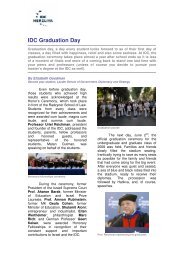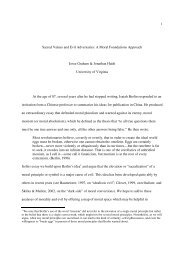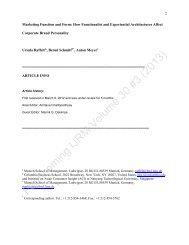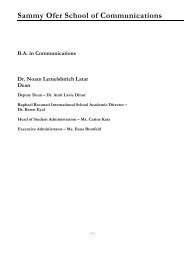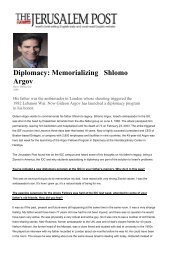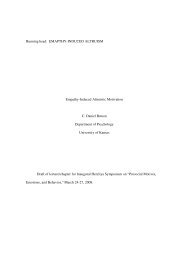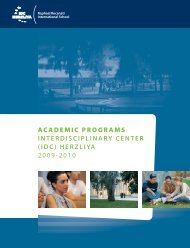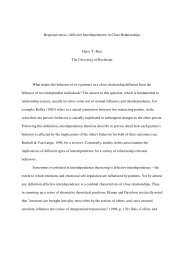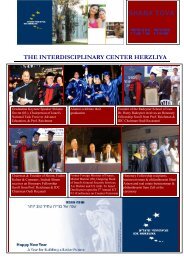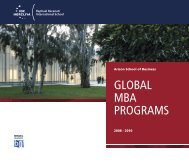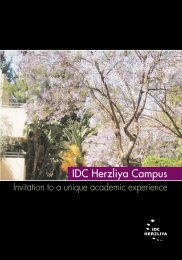The IDC
The IDC
The IDC
You also want an ePaper? Increase the reach of your titles
YUMPU automatically turns print PDFs into web optimized ePapers that Google loves.
34 < <strong>IDC</strong> Winter 2010<br />
One personal testimonial: <strong>The</strong> following is a letter recently<br />
received from one of our students spending this semester<br />
at Singapore Management University (SMU). It offers<br />
personal insight into the reasons why exchange programs<br />
are so important to an international university:<br />
“I have found studying at SMU a unique and challenging<br />
experience. In fact, this is my first time being out of Israel<br />
for such a long time and I can definitely guarantee that it is a<br />
recommended adventure that every student who can afford should<br />
do. Personally, the main advantage of this experience I’ve found<br />
is improving my English skills (mostly speaking, but also<br />
thinking, writing, reading and analyzing as well). Secondly,<br />
meeting so many people, local and from abroad (SMU has very<br />
strong connections with well-regarded universities), “tasting”<br />
their food and observing their customs, becoming familiar with<br />
the interesting traditions and holidays, especially since Singapore<br />
is a multi-cultural society, making this period of my life one<br />
that is colorful and happy. I am not going to paint this as<br />
perfect or void of disadvantages - mostly being home-sick at<br />
times - yet I think that I’ll be well-prepared to continue my<br />
studies at <strong>IDC</strong> because I consider this exchange-program as<br />
refreshing.”<br />
With Kind Regards, Liran Iancovici (Student of Law and Government)<br />
NEWLY FUNDED ACADEMIC PROJECTS<br />
<strong>IDC</strong> Herzliya continues to make great progress this year<br />
with grant submissions and newly funded projects.<br />
Competitive grants have been received from the Israel<br />
Science Foundation, General Motors, Microsoft,<br />
Amdocs, the Ministry of Defense, the US–Israel<br />
Binational Science Foundation, the Ministry of Industry,<br />
the Jewish Agency, <strong>The</strong> Israel Internet Association and the<br />
European Commission.<br />
the eu unDer the temPus PrOgrAm hAs<br />
funDeD An 800k multi-nAtiOnAl PrOPOsAl<br />
sPeArheADeD By iDc tO helP incOrPOrAte<br />
iDc AcADemic POlicies intO eurOPeAn-wiDe<br />
thinking – DesigneD tO fAcilitAte crOss-<br />
BOrDer mOBility Of stuDents AnD fAculty<br />
<strong>IDC</strong> and Europe: In the following paragraphs we discuss two projects,<br />
recently secured, that bring <strong>IDC</strong> Herzliya into the European Higher<br />
Education Area (EHEA).<br />
<strong>IDC</strong> Herzliya spearheaded, through the office of the Academic Secretary,<br />
the development and submission of a multi-national proposal to<br />
the European Union, under the TEMPUS program. This 800K Euro<br />
proposal, entitled Central Offices Responsible for the Integration at Home<br />
of Internationalisation as Assurance of quality in the Meda region, and to<br />
be managed by our Brussels-based partner, Vrije Universiteit Brussel, has<br />
been funded. Its main goal is to help us incorporate several features of<br />
our academic policies into current European-wide thinking – mainly the<br />
Bologna Process, designed to facilitate cross-border mobility of students<br />
and faculty.<br />
<strong>The</strong> core objectives of this project are the introduction of quality<br />
mechanisms specific to the process of internationalization and the services<br />
offered by the Central Offices for International Relations; preparation<br />
of specialists in the EHEA; implementation of EHEA instruments that<br />
facilitate mobility and joint ventures between European countries and the<br />
Middle East; the development of a strategy for internationalization; and<br />
a pilot project on the implementation of the European Credit Transfer<br />
System (ECTS). Finally, a goal is to disseminate results to third parties in<br />
Middle East.<br />
Through the Erasmus Mundus program of the European Union, we are also<br />
partner to another multi-national consortium that was recently funded –<br />
also managed by the Vrije Universiteit Brussel. This program allows <strong>IDC</strong><br />
Herzliya to offer several annual scholarships to students for semester-long<br />
exchange programs with partner institutions in Europe. Three students are<br />
already enjoying full scholarships this semester in Prague and Istanbul.<br />
SELECTED RESEARCH IN THE<br />
SPOTLIGHT:<br />
NEW SCHOOL OF PSYCHOLOGY<br />
To give the reader a sense of the varied research undertaken at <strong>IDC</strong> Herzliya,<br />
in this issue we spotlight several recent competitive research grants secured by<br />
<strong>IDC</strong> Herzliya researchers:<br />
Can Security-Enhanced Interventions Overcome Barriers to<br />
Compassion in Couple, Peer, and Intergroup Relationships? Prof.<br />
Mario Mikulincer (Psychology), Funded by Fetzer Institute,<br />
Kalamazoo, Michigan.<br />
Previous studies funded by the Fetzer Institute and<br />
conducted in our laboratories in the US and Israel,<br />
studies based on applications of Bowlby’s attachment<br />
theory, demonstrated that the experimental<br />
activation of a sense of attachment insecurity<br />
(“security priming”) increases empathy, compassion,<br />
and altruistic helping; heightens the salience of prosocial,<br />
self-transcendent values; and diminishes hostile reactions to<br />
the fetZer institute is funDing A stuDy<br />
By PrOf. mAriO mAkulincer tO PrOviDe A<br />
DeePer PsychOlOgicAl unDerstAnDing<br />
Of cOmPAssiOnAte lOve in sPecific<br />
relAtiOnAl cOntexts AnD suggest new<br />
wAys in which security Priming cAn Be<br />
useD tO fOster cOmPAssiOnAte lOve in the<br />
reAl wOrlD.<br />
members of outgroups. In other words, attachment security is a foundation<br />
for compassion and compassionate love for all humanity, one of the Fetzer<br />
Institute’s key concerns. We also found that chronic attachment insecurity<br />
(dispositional attachment anxiety and/or avoidance) are related to<br />
deficiencies in empathy and altruism and to lack of tolerance for outgroup<br />
members. <strong>The</strong> three-year research program proposed here will extend our



